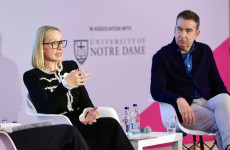Politics
Lucinda Creighton Critiques Irish Politics at MacGill Summer School

During a recent discussion at the MacGill Summer School in Glenties, Co Donegal, former Minister for European Affairs Lucinda Creighton expressed her concern over the current state of Irish politics. She argued that the national conversation is dominated by trivial issues, rather than focusing on substantial governance challenges. Creighton stated, “We’re more interested in the gossipy aspect of our parliamentary politics, rather than the nuts and bolts of how we’re governing our country.”
Creighton emphasized that the political system is currently “not fit for purpose,” noting that discussions often revolve around irrelevant topics, such as who may occupy the Áras in November. She criticized the “gossipy aspect” of politics, suggesting that it detracts from addressing pressing issues, including the ongoing housing crisis and the challenges in the energy sector.
Challenges of Governance and Leadership
According to Creighton, the inefficiencies in governance stem from an overwhelming need for caution. “Everything is, as far as I can see, government is completely strangled by the need to cover our backside and have multiple reviews about every single decision that’s ever been taken,” she remarked. This environment fosters a culture of risk aversion that hampers effective leadership and decision-making.
Creighton pointed out that this cautious approach contributes to the persistent housing crisis, which lacks “any clear, logical solution.” Furthermore, she highlighted issues within the electricity grid, describing it as “not fit for purpose” and contributing to unmet renewable energy goals.
She attributed some of these challenges to the one-year budget cycle, arguing that long-term planning is not integrated into the electoral system. “If we’re to get to grips with the sort of radical change that is happening around us right now, we have to think about how we change our politics and our system of governance,” Creighton urged. She stressed the need to equip policymakers to handle emerging challenges effectively.
Understanding Voter Concerns
In her talk entitled “Why is Liberalism Failing?”, Creighton also discussed the disconnect between political parties, particularly those on the center-left, and their constituents. She noted that research indicates a growing perception of condescension from these politicians towards voters. “If somebody expresses concern about immigration, they’re labeled far right,” she explained. This labeling, she argued, alienates voters and drives them towards extreme political alternatives.
Creighton emphasized the importance of listening to voters’ concerns rather than dismissing them. She suggested that many of these individuals experience insecurity and discomfort with rapid societal changes, which should be acknowledged rather than scorned by politicians.
Additionally, Creighton addressed the Irish government’s decision to dismantle the Triple Lock system, which currently requires multiple approvals for Irish military involvement abroad. She expressed pride in this decision, describing the Triple Lock as “an ineffectual tool” that hinders effective action in an increasingly polarized global environment.
“It’s going to be increasingly difficult in this world of authoritarianism and polarization to get things done through multilateral organizations such as the United Nations,” she warned. Creighton advocated for the necessity of forming a “coalition of the willing” to address critical issues effectively.
Overall, Lucinda Creighton’s remarks at the MacGill Summer School highlighted a pressing need for a more engaged and responsible political discourse in Ireland. Her insights resonate with ongoing concerns about governance and the importance of addressing voters’ genuine issues.
-

 Top Stories3 months ago
Top Stories3 months agoTributes Surge for 9-Year-Old Leon Briody After Cancer Battle
-

 Entertainment4 months ago
Entertainment4 months agoAimee Osbourne Joins Family for Emotional Tribute to Ozzy
-

 Politics4 months ago
Politics4 months agoDanny Healy-Rae Considers Complaint After Altercation with Garda
-

 Top Stories4 months ago
Top Stories4 months agoIreland Enjoys Summer Heat as Hurricane Erin Approaches Atlantic
-

 World5 months ago
World5 months agoHawaii Commemorates 80 Years Since Hiroshima Bombing with Ceremony
-

 Top Stories3 months ago
Top Stories3 months agoNewcastle West Woman Patricia Foley Found Safe After Urgent Search
-

 Top Stories5 months ago
Top Stories5 months agoFianna Fáil TDs Urgently Consider Maire Geoghegan-Quinn for Presidency
-

 World5 months ago
World5 months agoCouple Convicted of Murdering Two-Year-Old Grandson in Wales
-

 World5 months ago
World5 months agoGaza Aid Distribution Tragedy: 20 Killed Amid Ongoing Violence
-

 World5 months ago
World5 months agoAristocrat Constance Marten and Partner Convicted of Infant Murder
-

 Top Stories4 months ago
Top Stories4 months agoClimbing Errigal: A Must-Do Summer Adventure in Donegal
-

 Top Stories4 months ago
Top Stories4 months agoHike Donegal’s Errigal Mountain NOW for Unforgettable Summer Views









